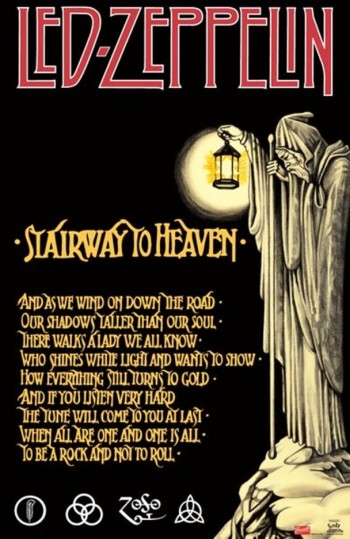DANGEROUS MINDS: Led Zeppelin’s appearance on Danish television in 1969 is one of the classic moments of rock music history. It was Zeppelin’s second time on television but their very first playing a full live set of songs in front of a studio audience—they had previously lip-synched to “Communication Breakdown” for Swedish TV. What is surprising watching this superb concert is the audience’s lack of response to Zeppelin’s fully charged performance. They sit listening intently showing little enthusiasm for what they’re hearing. For guitarist Jimmy Page this sort of apathy was part of the appeal of launching his newly formed band in Scandinavia: “They don’t cheer too madly there, you know? We were really scared, because we only had about fifteen hours to practice together. It was sort of an experimental concert to see if we were any good. I guess.” MORE
LOS ANGELES TIMES: Also Tuesday, Anderson tried to rebut earlier testimony from an economist who estimated “Stairway” had brought in millions of dollars in profits for Zeppelin and the various music companies affiliated with the band. Tim Gardner, a British accountant who helps to keep the band members’ financial books, testified that the roughly $60 million suggested earlier in the trial had been grossly exaggerated. The song, he said, had earned Page a relatively paltry  $615,000 and Plant $532,000 since mid-2011, a cutoff called for under copyright law. Infringement cases can proceed decades after the original release of a protected work, but the period subject to damage awards is limited to three years before release of the latest iteration of the work in question.
$615,000 and Plant $532,000 since mid-2011, a cutoff called for under copyright law. Infringement cases can proceed decades after the original release of a protected work, but the period subject to damage awards is limited to three years before release of the latest iteration of the work in question.
The much larger amount offered up by the economist, Gardner said, was misleading because it included payments for all 87 songs in Zeppelin’s music catalog, among other reasons. Similarly, the chief financial officer for Rhino Records, the record company that has reissued many of the band’s albums, said that after deducting the costs of making and distributing “Stairway,” the company made $868,000 on the song during the period in question. The debate over profits is significant. If the jury does find that Zeppelin lifted a part of “Taurus,” the amount of money it could award Wolfe’s estate would depend on how much “Stairway” has earned. MORE
ROLLING STONE: As its primary expert witness testifying to the musical similarities between the Spirit and Led Zeppelin compositions, the defense called Dr. Lawrence Ferrara, a full professor of music and “director emeritus” at NYU and an esteemed musicologist with an impressive list of music-legend clients – Billy Joel, Paul McCartney, Elton John, Marc Anthony, Enrique Iglesias, Lady Gaga, Gloria Estefan, Bruce Springsteen, Brad Paisley, Jay Z, Usher, Dr. Dre, Kanye West, Eminem, Prince and James Brown among them. On the stand, Ferrara made a sophisticated analysis as to why “Stairway to Heaven” did not plagiarize “Taurus.” However, his academic approach proved confusing, and at times patronizing; when asked about his credentials, Ferrara bragged about owning all 29 editions of the Grove Dictionary of Music and stated, “I have authored or co-authored three books, one of which is in its fifth edition.” […] Ferrara invoked was the Modern Folk Quartet’s 1963 version of the public-domain Appalachian folk traditional “To Catch a Shad.” When Ferrara played the first part of “Stairway to Heaven” followed by “To Catch a Shad” on the piano, it proved one of the trial’s most startling revelations yet: it was almost impossible to tell them apart – they sounded like the exact same song. The tactic was intended to demonstrate the unoriginality and ordinariness of the musical techniques shared by “Taurus” and “Stairway” – that they can be found utilized in music compositions in many forms and genres going back hundreds of years. Instead, Ferrara’s example may not have been received as intended. To some ears, it suggested another possibility – that Led Zeppelin had no qualms bogarting whole chunks of preexisting compositions in the songwriting process that led to “Stairway.” MORE
PREVIOUSLY: All That Glitters Is Not Gold
